虚拟语气的规则总结(word版)
(完整word版)虚拟语气用法详解(word文档良心出品)

虚拟语气用法详解一、条件句中的虚拟语气1. 条件句中虚拟语气的形式从句中提出一种与客观现实不相符或根本不可能存在的条件,主句会产生的一种不可能获得的结果。
条件句中的2. 条件句中的虚拟语气的举例(1) 将来时的条件句中的虚拟语气。
如:If he should go to Qing Hua University, he would make full use of his time. 如果他要上清华大学的话,他就会充分利用他的时间了。
If he were to come here, he would tell us about it. 如果他要来的话,他会通知我们一声。
(2) 现在时的条件句中的虚拟语气。
如:If he were free, he would help us. 要是他有空的话,它会帮助我们的。
If he studied at this school, he would know you well. 如果他在这所学校学习的话,它会对你很熟悉。
(3)过去时的条件句中的虚拟语气。
如:If I had seen the film, I would have told you about it. 我如果看过这场电影,我会把电影内容告诉你了。
If I had got there earlier, I would have met Mr. Li. 如果我早点到那儿,我就会会到了李先生。
3. 运用条件句中的虚拟语气时,须注意的几个问题(1)当从句的主语为第三人称单数时,谓语动词若是系动词be时,可用was 代替were。
但在倒装虚拟结构及if I were you, as it were 中,只能用were。
如:Were I ten years younger, I would study abroad. 要是我还年轻十岁的话,我会去国外学习。
If I were you, I would try my best to grasp the chance. 要是我是你的话,我要尽力抓住这次机会。
(完整版)虚拟语气用法小结

虚拟语气用法小结一、虚拟语气在条件从句中的用法条件句有两类,一类是真实条件句,一类是虚拟条件句。
如果假设的情况是有可能发生的,就是真实条件何.在这种真实条件句中的谓语用陈述语气。
如: If it doesn't rain tomorrow, we will go to the park.如果假设的情况是过去或现在都不存在的,或将来不大可能发生的,则是虚拟条件句。
如: If he had seen you yesterday, he would have asked you about it。
如果他昨天见到你,他会问你这件事的。
(事实上他昨天没见到你,因此也未能问你这件事。
)1。
在含有虚拟条件句的复合句中,主句和从句的谓语都要用虚拟语气。
虚拟条件从句和主句的动词形式列表如下:2。
错综时间条件句:有时条件从句中的动作和主句中的动作发生的时间不一致(表示错综时间的虚拟语气),这时动词的形式要根据它所表示的时间加以调整。
If you had listened to the doctor, you would be all right now。
如果你当初听了医生的话,身体现在就好了。
(从句动作指过去,主句动作指现在)3。
省略连词if (倒装)。
在书面语中,如果虚拟条件从句中有were,had 或 should,可以把if省略,把这几个词放到主语之前,构成主谓倒装.Should he come (If he should come), tell him to ring me up.Were I you (If I were you), I would not do it。
Were I to meet him tomorrow (= if I were to met him tomorrow), I should ask him about it。
要是我明天见到他,我就会问他这件事的。
Had I had the money last year (= if I had had the money last year), i would have bought the house. 如果我去年有了这笔钱,我就买那所房子了.Should there be any trouble with the boiler, the automatic controlling unit would cut off the fuel oil supply. 假如锅炉出问题的话,自控装置会自动切断燃油的供给.4。
(完整)虚拟语气用法总结,推荐文档

虚拟语气的用法总结语气:语气是动词的一中形式,它表示说话人对某一行为或事情的看法和态度。
语气的种类:(1 )陈述语气表示动作或状态是现实的,确定的或符合事实的,用于陈述句,疑问句和某些感叹句。
如We are ready. What a fine day it is!(2 )祈使语气表示说话人的建议,请求,邀请,命令等。
如Ope n the door, Please.应注意以下几点:1. 主语通常是第二人称you,但多不出现,动词用原形,否定用don ot或者don'加动词原形(或be)女口Be careful next time. Don 'smoke here.2. 有时为了强调,主语也可以出现,而且可以是第三人称,谓语动词不加-s或者-es如You be quiet.He sta nd up.3. 祈使语气可以用do加强语气女口Do come to see this Sunday.4. 在Let's的祈使句后,疑问部分通常用shall we ;在Let us后,疑问部分用will you女口Let' goout for a walk after supper , shall we? /Let us clean our classroom, will you?5. 祈使句与连词and连用时相当于一个条件句,而and之后则是表示结果。
如Think hardand you will have a good idea.(3)虚拟语气表示动作或状态不是客观存在的事实,而是说话人的主观愿望,假设或推测等。
女口If I were you, I should study En glish.一. 虚拟语气在条件从句的用法条件句有两类,一类是真实条件句;一类是非真实条件句,也就是虚拟条件句。
如果假设的情况是有可能发生的,就是真实条件句,谓语要用陈述语气。
如If it doesn S rain tomorrow, we will go to the park.如果假设的情况是过去或现在都不存在的,或将来不大可能发生的,则是虚拟条件句。
(完整版)英语虚拟语气语法归纳总结
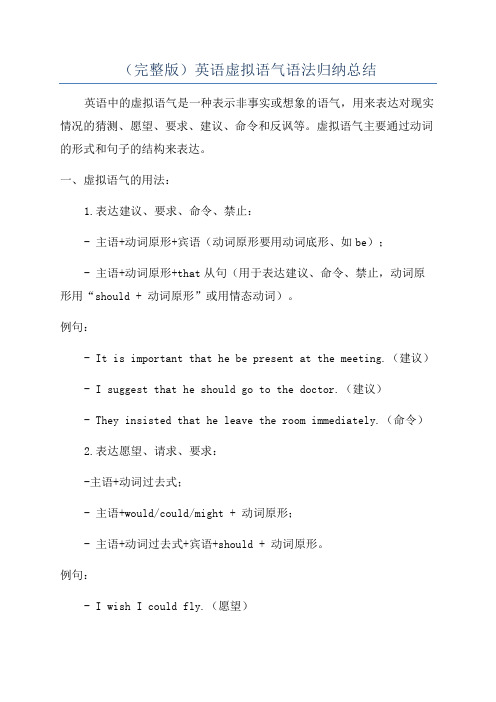
(完整版)英语虚拟语气语法归纳总结英语中的虚拟语气是一种表示非事实或想象的语气,用来表达对现实情况的猜测、愿望、要求、建议、命令和反讽等。
虚拟语气主要通过动词的形式和句子的结构来表达。
一、虚拟语气的用法:1.表达建议、要求、命令、禁止:- 主语+动词原形+宾语(动词原形要用动词底形、如be);- 主语+动词原形+that从句(用于表达建议、命令、禁止,动词原形用“should + 动词原形”或用情态动词)。
例句:- It is important that he be present at the meeting.(建议)- I suggest that he should go to the doctor.(建议)- They insisted that he leave the room immediately.(命令)2.表达愿望、请求、要求:-主语+动词过去式;- 主语+would/could/might + 动词原形;- 主语+动词过去式+宾语+should + 动词原形。
例句:- I wish I could fly.(愿望)- I would appreciate it if you could help me.(请求)3.表示虚拟条件:- If条件从句中的谓语动词用过去完成时,主句用would/should/might/could + have + 过去分词;- If条件从句中的谓语动词用过去时,主句用would/should/could + 动词原形。
例句:- If I had known his phone number, I would have called him.(虚拟条件)- If you had listened to me, we could have finished the project earlier.(虚拟条件)4.表达建议、要求、祝愿:- If only内部称述 + 主语 + 过去式。
虚拟语气用法总结(超好)
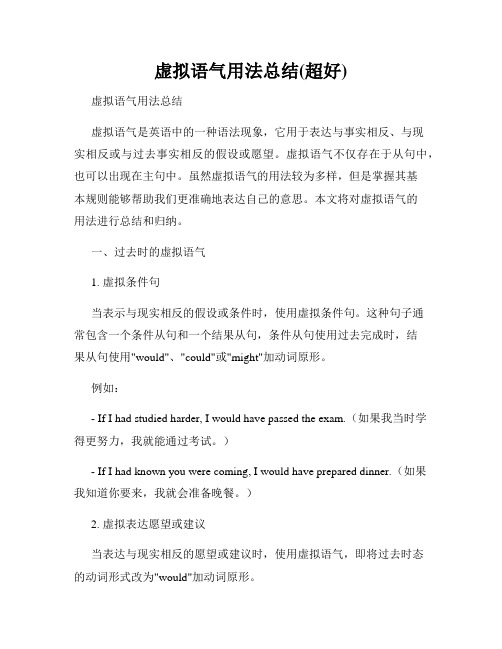
虚拟语气用法总结(超好)虚拟语气用法总结虚拟语气是英语中的一种语法现象,它用于表达与事实相反、与现实相反或与过去事实相反的假设或愿望。
虚拟语气不仅存在于从句中,也可以出现在主句中。
虽然虚拟语气的用法较为多样,但是掌握其基本规则能够帮助我们更准确地表达自己的意思。
本文将对虚拟语气的用法进行总结和归纳。
一、过去时的虚拟语气1. 虚拟条件句当表示与现实相反的假设或条件时,使用虚拟条件句。
这种句子通常包含一个条件从句和一个结果从句,条件从句使用过去完成时,结果从句使用"would"、"could"或"might"加动词原形。
例如:- If I had studied harder, I would have passed the exam.(如果我当时学得更努力,我就能通过考试。
)- If I had known you were coming, I would have prepared dinner.(如果我知道你要来,我就会准备晚餐。
)2. 虚拟表达愿望或建议当表达与现实相反的愿望或建议时,使用虚拟语气,即将过去时态的动词形式改为"would"加动词原形。
例如:- I wish I were taller.(我希望我更高。
)- She suggested that he take a bus.(她建议他坐公交车。
)二、现在时的虚拟语气1. 虚拟条件句与过去时的虚拟条件句类似,现在时的虚拟条件句也包含一个条件从句和一个结果从句。
条件从句使用"were to"结构或"should"加动词原形,结果从句使用"would"、"could"或"might"加动词原形。
例如:- If I were to win the lottery, I would travel the world.(如果我中了彩票,我会周游世界。
(word完整版)虚拟语气表格归纳,推荐文档

去if:Were she younger,she,would do it.
虚拟语气在as if/as though引导的方式状语从句中
1.表示与现在事实相反或对现在情况有怀疑,谓语动词用过去式。
2.表示与过去事实相反,谓语动词用过去完成时。
在“It is (was)+名词+that…..”结构句中的虚拟语气
表示建议,命令,请求,道歉,怀疑,惊奇等。
这类名词有:advice,decision,desire,demand,idea,order,pity,proposal,recommendation,suggestion,surprise,wish,wonder等。
3.表示与将来事实相反
注意:1.在as if/as though句中,如果有可能成为事实,用陈述语气。例:He looks as if he going to be ill.
2.as though或as if引导的状语从句,从句主语和主句主语相同时,从句中可省略主语和部分谓语。
虚拟语气用在lest,for fear that,so that及in order that引导的目的状语从句中表示“以防,以免”等意思
表语从句或同位语从句中的虚拟语气
2.也可以用陈述语气。
例:They are willing to surrender provided they are given free pardon..
“In case”引导的从句中即可用陈述句,也可以用虚拟语气
(should)+动词原型
例:1.The game will be put off in case it (should) snow.
(完整word版)虚拟语气表格归纳

状语从句中的虚构语气虚构语气在 if 指引的条从句(条件)主句(目的)件句中的用法三点:表示于此刻事实相反的If+ 主语 +动词的过去式( be 用主语 +would(shouldcould虚构条件句were)might)+ 动词原型表示与过去事实相反的If+ 主语 +had+ 动词的过去分主语 +would ( should could 拟条件句词might ) +have+动词的过去分词表示与未来事实相反的If+ 主语 +should( were to) + 主语 +would ( could should 虚构条件句动词原型 / 动词的过去式might ) +动词原型混淆条件句——主从句有时条件从句中的动作与主句中的动作,发生的时间不一致,时间不一致的状况下的这是动作的形式应依据它所表示的时间加以调整。
虚构语气有时虚构条件句并没用if从句表示出来,而是用介词短语委婉条件句( otherwise ,or ,without ,but for )上下文或其余方式来表示。
条件从句中省略 if 采纳倒装语序的状况虚拟语气在 as if/as though 指引的方式状语从句中1.条件暗含在短语中;2.条件暗含在上下文中;3.虚构式变成习惯说法,很难找出其暗含的条件。
在if 指引的表示虚构的条件状语从句中,有时能够把虚构条件中的连词 if 省去,而将 had , should , were 等助动词提到主语以前。
例:原句: If she were younger,she,would do it.去if : Were she younger,she,would do it.1.表示与此刻事实相反或对此刻状况有思疑,谓语动词用过去式。
2.表示与过去事实相反,谓语动词用过去达成时。
3.表示与未来事实相反注意: 1.在 as if/as though 句中,假如有可能成为事实,用陈说语气。
例: He looks as if he going to be ill.2.as though 或 as if 指引的状语从句,从句主语和主句主语同样时,从句中可省略主语和部分谓语。
完整版)虚拟语气用法归纳

完整版)虚拟语气用法归纳虚拟语气是动词的一种形式,表示说话人对某一行为或事情的看法和态度。
语气的种类包括陈述语气、祈使语气和虚拟语气。
陈述语气用于陈述句、疑问句和某些感叹句,表示动作或状态是现实的、确定的或符合事实的。
例如:“XXX.”,“XXX?”和“How good a teacher she is!”祈使语气表示说话人对对方的请求或命令。
例如:“Never be XXX!”和“Don’t et to turn off the light.”虚拟语气表示动作或状态不是客观存在的事实,而是说话人的主观愿望、假设或推测等。
例如:“If I were a bird。
I could fly in the air.”,“I wish I could pass the XXX.”和“May you succeed!”在简单句中,虚拟语气常用于情态动词的过去式用于现在时态时,表示说话人的谦虚、客气、有礼貌、或委婉的语气,常用于日常会话中。
例如:“XXX to show me the way to the post office?”和“It would be better for you not to stay up too late.”虚拟语气还可以用于表达祝愿,常用“may+动词原形”表示。
例如:“May good luck be yours!”,“May you be happy!”和“May you do even better!”。
还可以用于表达愿望和建议。
例如:“If only XXX.”和“XXX.”如果我现在有时间,我会和他们一起去。
(陈述语气)如果我现在是你,我就会和他们一起去。
(虚拟语气)与过去事实相反:若与过去事实相反,条件从句的谓语用过去完成时(be动词用had been),主句谓语用“should (would。
could。
might)+have+过去分词”。
如:如果我昨天有时间,我就和他们一起去了。
(word完整版)高中英语语法-虚拟语气全总结,推荐文档

①错综时间条件句:当条件状语从句表示的行为和主句表示的行为所发生的时间不一致时,被称为错综时间条件句,动词的形式要根据它表示的时间作出相应的调整。
如:If you had followed my advice just now, you would be better now. If you had studied hard before, you would be a college student now.②i f省略句在条件句中可以省略if,把were, had, should提到句首,变成倒装句式。
如:If I were at school again, I would study harder. T Were I at school aga in, I would study harder.如果我还有上学的机会,我会更加努力学习。
If you had come earlier, you would catch the bus.T Had you come earlier, you would catch the bus.如果你来得早点,你就能赶上公共汽车。
If it should rain tomorrow, we would not go climb ing.T Should it rain tomorrow, we would not go climbing. 如果明天下雨的话,我们就不能登山去了。
③用介词代替条件状语从句常用的介词有with, without, but for。
如:What would you do with a million dollars ? (=if you had a million dollars) 如果你有100万元,你会做什么?We couldn 't have finished the work ahead of time without your help . (=if we hadn 'tgot your help)没有你的帮助,我们不可能提前完成这项工作。
虚拟语气的规则总结word版

虚拟语气虚拟语气:表示动作或状态不是客观存在的事实,而是说话人的主观愿望、假设或推测等。
一、if从句:(一)(二)错综时间的虚拟句:通常情况下,在条件句中主句和从句的谓语动词所指时间一致, 但有时也可能指不同的时间,这时主句和从句的动作不是发生在同一时间,其动词形式要根据时间而定。
1. If I were you, I would have taken his advice. (从句指现在, 主句指过去)。
2. If I had taken my raincoat with me this morning, I would not be wet now. (从句指过去,主句指现在)。
3. If we hadn’t been working hard in the past few years, things wouldn’t be going so smoothly.(从句指过去,主句指现在)。
4. If the weather had been more favorable, the crops would be growing still better.(从句指过去,主句指现在)。
5. If we had not got everything ready by now, we should be having a more terrible time tomorrow. (从句指现在,主句指将来)(三)省略:If 从句中含有were, should, had时,可省略if并把were, should, had提前。
例如:Were I you, I wouldn’t quarrel with him.备注:注:would, should, could与might的选择:①一般常用would,如同在真实条件句中主句常要用will一样。
常译作“将、就会”。
如:If I knew him, I would ask him for help. 如果我认识他的话,我就会向他求助。
虚拟语气知识点用法总结
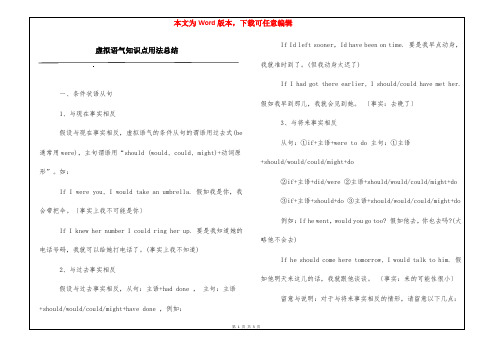
虚拟语气知识点用法总结一、条件状语从句1、与现在事实相反假设与现在事实相反,虚拟语气的条件从句的谓语用过去式(be 通常用were),主句谓语用“should (would, could, might)+动词原形”。
如:If I were you, I would take an umbrella. 假如我是你,我会带把伞。
〔事实上我不可能是你〕If I knew her number I could ring her up. 要是我知道她的电话号码,我就可以给她打电话了。
(事实上我不知道)2、与过去事实相反假设与过去事实相反,从句:主语+had done ,主句:主语+should/would/could/might+have done ,例如:If Id left sooner,Id have been on time. 要是我早点动身,我就准时到了。
(但我动身太迟了)If I had got there earlier, I should/could have met her. 假如我早到那儿,我就会见到她。
〔事实:去晚了〕3、与将来事实相反从句:①if+主语+were to do 主句:①主语+should/would/could/might+do②if+主语+did/were ②主语+should/would/could/might+do③if+主语+should+do ③主语+should/would/could/might+do例如:If he went,would you go too? 假如他去,你也去吗?(大略他不会去)If he should come here tomorrow, I would talk to him. 假如他明天来这儿的话,我就跟他谈谈。
〔事实:来的可能性很小〕留意与说明:对于与将来事实相反的情形,请留意以下几点:一是这里说的与将来事实相反,实为对将来状况的推想;二是此用法中的条件从句谓语除用过去式外,有时也用“should+动词原形”(表示可能性微小,常译为“万一”)或“were to+动词原形”(表示与将来事实相反的假设);三是当条件从句运用“should+动词原形”这样的谓语时,主句谓语除可用“should (would, could, might)+动词原形”这样的虚拟语气外,也可用陈述语气或祈使语气。
虚拟语气用法总结(完整)
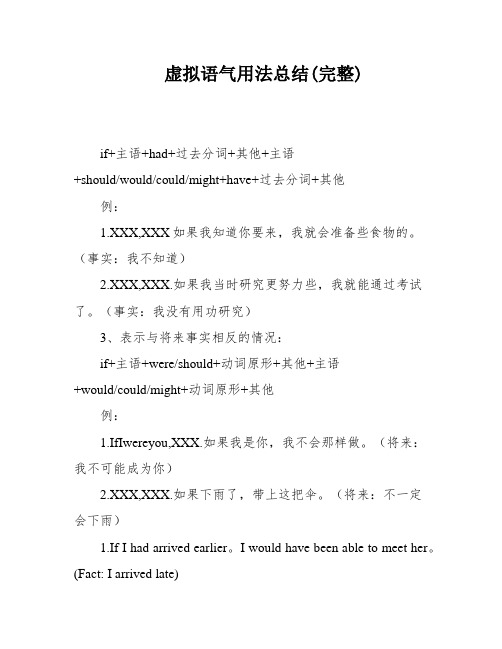
虚拟语气用法总结(完整)if+主语+had+过去分词+其他+主语+should/would/could/might+have+过去分词+其他例:1.XXX,XXX如果我知道你要来,我就会准备些食物的。
(事实:我不知道)2.XXX,XXX.如果我当时研究更努力些,我就能通过考试了。
(事实:我没有用功研究)3、表示与将来事实相反的情况:if+主语+were/should+动词原形+其他+主语+would/could/might+动词原形+其他例:1.IfIwereyou,XXX.如果我是你,我不会那样做。
(将来:我不可能成为你)2.XXX,XXX.如果下雨了,带上这把伞。
(将来:不一定会下雨)1.If I had arrived earlier。
I would have been able to meet her。
(Fact: I arrived late)2.If he had XXX my advice。
he would not have made such a mistake。
(Fact: He didn't listen to me)3.If he were to come here tomorrow。
I would talk to him。
(Fact: It's XXX he will come)In expressing ns。
orders。
requests。
etc。
the subjunctive mood is often used in the object clause。
with the verb in the form of "should + infinitive," which can be omitted.Other uses of XXX:1.The subjunctive mood is used in the object clause after "wish" to express a XXX fact。
(完整版)虚拟语气(表格整理)

虚拟语气(Subjunctive Mood)1.if(条件状语从句)2.wish(宾语从句)/if only(要是……就好了)3.would rather+ 从句(表示宁愿某人在现在或将来要做某事或过去做过某事)4.as if/as though,even if/though + 从句--------------------------------------------------------------------- 5.在表示“坚持、要求、命令、建议”之类的动词后的宾语从句中,用“(should)+动词原形”。
6.虚拟语气用于主语从句7.虚拟语气用于表语从句、同位语从句 [用(should)+动词原形]8.虚拟语气用于定语从句这种从句常用在It is (high) time (that)...句型中,定语从句的谓语动词用过去式或should + 动词原形(should不能省略,be用were来表示),意【好题珍藏】1.Grace doesn’t want to move to New York because she thinks if she there, she wouldn’t be able to see her parents very often. (Pano M6 P16:15) A.lives B.would live C.has lived D.were to live【解析】主句说明了客观事实,if从句是对将来事实的假设。
见“1.if(条件状语从句)——与将来事实相反”。
【答案】D2.If Mr.Dewey present,he would have offered any possible assistance to the people there. (Pano M6 P16:16) A.were B.had been C.should be D.was【解析】见“1.if(条件状语从句)——与过去事实相反”。
虚拟语气用法归纳文档
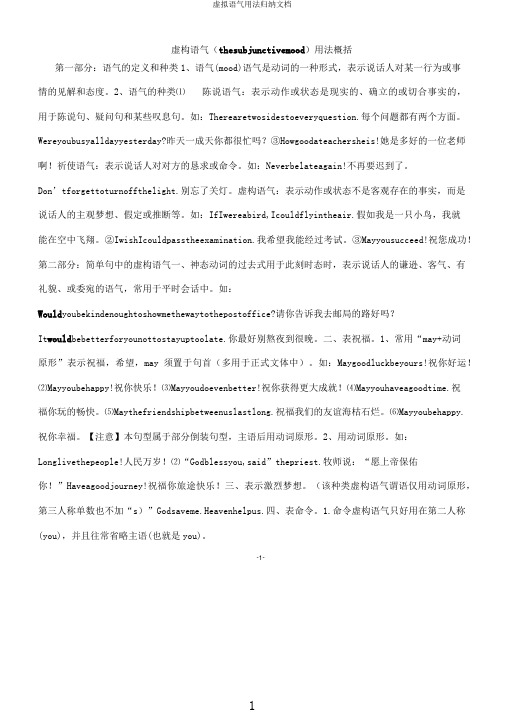
虚构语气(thesubjunctivemood)用法概括第一部分:语气的定义和种类1、语气(mood)语气是动词的一种形式,表示说话人对某一行为或事情的见解和态度。
2、语气的种类⑴陈说语气:表示动作或状态是现实的、确立的或切合事实的,用于陈说句、疑问句和某些叹息句。
如:Therearetwosidestoeveryquestion.每个问题都有两个方面。
Wereyoubusyalldayyesterday?昨天一成天你都很忙吗?③Howgoodateachersheis!她是多好的一位老师啊!祈使语气:表示说话人对对方的恳求或命令。
如:Neverbelateagain!不再要迟到了。
Don’tforgettoturnoffthelight.别忘了关灯。
虚构语气:表示动作或状态不是客观存在的事实,而是说话人的主观梦想、假定或推断等。
如:IfIwereabird,Icouldflyintheair.假如我是一只小鸟,我就能在空中飞翔。
②IwishIcouldpasstheexamination.我希望我能经过考试。
③Mayyousucceed!祝您成功!第二部分:简单句中的虚构语气一、神态动词的过去式用于此刻时态时,表示说话人的谦逊、客气、有礼貌、或委宛的语气,常用于平时会话中。
如:Would youbekindenoughtoshowmethewaytothepostoffice?请你告诉我去邮局的路好吗?It would bebetterforyounottostayuptoolate.你最好别熬夜到很晚。
二、表祝福。
1、常用“may+动词原形”表示祝福,希望,may须置于句首(多用于正式文体中)。
如:Maygoodluckbeyours!祝你好运!⑵Mayyoubehappy!祝你快乐!⑶Mayyoudoevenbetter!祝你获得更大成就!⑷Mayyouhaveagoodtime.祝福你玩的畅快。
演讲稿虚拟语气用法总结(超好,原创)完整版

优选
7
If you ______ with George earlier, you _____ so angry now.
A.talked; would not be B.had talked; would not be C.would talk; would not be D.had talked; would not have been
5.Without / But for your help, we couldn’t have finished the work ahead of time.
=If it had not been for your help, …
优选
12
Without electricity, human being life ______ quite different today.
优选
8
If we had taken such effective measures much earlier, the river _____ so seriously now.
A.is not polluted
B.would not be polluted
C.had not been polluted
优选
14
He hesitated for a moment before kicking the ball, otherwise he _____ a goal.
A.had scored B.scored C.would score D.would have scored
优选
15
— Why didn’t you buy it? — I ______ but I didn’t have the money. A. would B. would have C. had had D. had bought
(完整版)虚拟语气语法归纳..doc
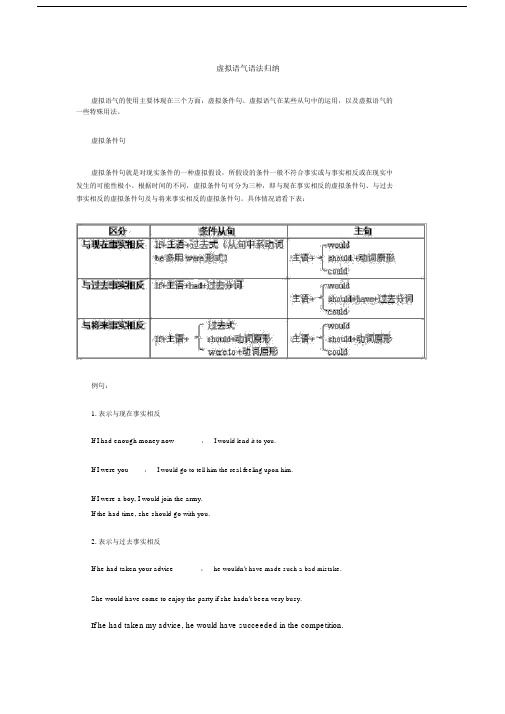
虚拟语气语法归纳虚拟语气的使用主要体现在三个方面:虚拟条件句、虚拟语气在某些从句中的运用,以及虚拟语气的一些特殊用法。
虚拟条件句虚拟条件句就是对现实条件的一种虚拟假设,所假设的条件一般不符合事实或与事实相反或在现实中发生的可能性极小。
根据时间的不同,虚拟条件句可分为三种,即与现在事实相反的虚拟条件句、与过去事实相反的虚拟条件句及与将来事实相反的虚拟条件句。
具体情况请看下表:例句:1.表示与现在事实相反If I had enough money now,I would lend it to you.If I were you,I would go to tell him the real feeling upon him.If I were a boy, I would join the army.If the had time, she should go with you.2.表示与过去事实相反If he had taken your advice,he wouldn't have made such a bad mistake.She would have come to enjoy the party if she hadn't been very busy.If he had taken my advice, he would have succeeded in the competition.3.表示与将来事实相反I would go shopping with you if it were to be Sunday tomorrow.If he were to be given another chance to do it again,he could certainly achieve more.If it were to rain tomorrow, the football match would be put off.1.虚拟条件句的倒装在虚拟条件句中,为了强调所假设条件的虚拟性,或突出说话人的一种主观愿望,虚拟条件句可用倒装结构。
(word完整版)英语虚拟语气语法归纳总结,文档

(word完满版)英语虚假语气语法归纳总结,文档虚假语气 :表示说的话不是事实,不可以能发生也许说可能性很小的情况,表达一种梦想、建议、假设。
一、条件状语从句中的用法从句谓语形式主句谓语形式现在were/ did would/could/should(+not)+ do过去had donewould/could/should/might(not)+ have done将来 1.were/did would/could/should/might2.should do(not)3.were to do+ do简单记法:if were/did, would doif had done, would have doneif were to do/should do, would do举例:If I were you, I would do nothing about it.If you had taken your teacher’ s advice, you wouldn’ t have made such a mistake.If it were to/ should rain tomorrow(表示降水率很低 ),they wouldn’ t go shopping.附注:虚假语气,条件状从倒装状语从句中,去掉if,提前were/ had/ should如: If I were you, I would give up.→Were I you, I would give upIf you had taken the advice, you would have .→ Had you taken the advice, you would haveIf the world should come to an end,→ Should the world come to an end别的, without, but for, otherwise 构成的条件状语从句中,也有委宛的虚假语气But for the popularization of electricity, we would lead a whole different life today. (popularization 普及, publicity 宣传 )Without your help, I would have failed.We’ ll go earlier, otherwise we wouldn’〔tget表示a可seat能性.小〕但其实,高中英语考试也常考:错综虚假语气条件句即:假设条件状从发生的时间与所假设的谓语动词不一致,此时,主句和从句要依照各自的时间而定。
虚拟语气知识点总结
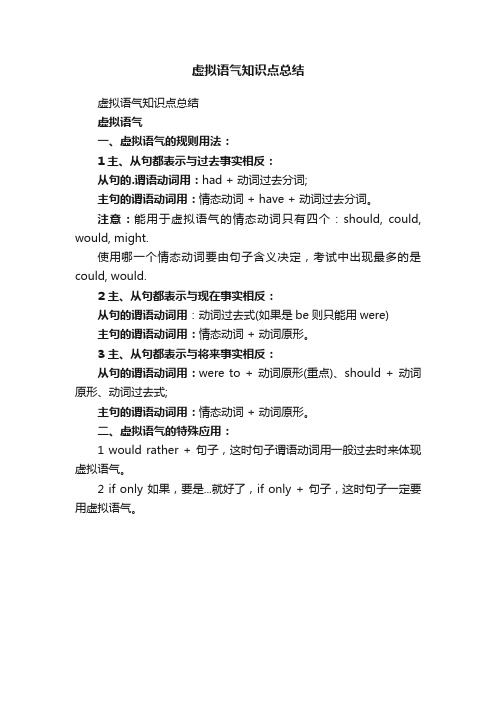
虚拟语气知识点总结
虚拟语气知识点总结
虚拟语气
一、虚拟语气的规则用法:
1主、从句都表示与过去事实相反:
从句的.谓语动词用:had + 动词过去分词;
主句的谓语动词用:情态动词 + have + 动词过去分词。
注意:能用于虚拟语气的情态动词只有四个:should, could, would, might.
使用哪一个情态动词要由句子含义决定,考试中出现最多的是could, would.
2 主、从句都表示与现在事实相反:
从句的谓语动词用:动词过去式(如果是be则只能用were)
主句的谓语动词用:情态动词 + 动词原形。
3 主、从句都表示与将来事实相反:
从句的谓语动词用:were to + 动词原形(重点)、should + 动词原形、动词过去式;
主句的谓语动词用:情态动词 + 动词原形。
二、虚拟语气的特殊应用:
1 would rather + 句子,这时句子谓语动词用一般过去时来体现虚拟语气。
2 if only 如果,要是...就好了,if only + 句子,这时句子一定要用虚拟语气。
虚拟语气知识点总结(word)

虚拟语气知识点总结(word)一、初中英语虚拟语气1.—I don’t know what to wear at the party.— If I you, I would wear a shirt and a tie.A.am B.is C.were D.was【答案】C【解析】试题分析:if从句的虚拟语气,对于现在的虚拟用一般过去式,be动词都用were,故选C.句意:——我不知道聚会该穿什么。
——如果我是你,我会穿一件衬衫加一条领带。
故选C 考点:if条件句的虚拟语气点评:if条件句的虚拟语气,是中考要求掌握的知识点,分为三种情况:表示与现在事实相反的情况,从句谓语动词用一般过去式(be用were),主句谓语动词用should/would/could/might +do;2.表示与过去的事实相反的情况,从句谓语动词用过去完成时,主句谓语动词用should/would/could/might+have done;3.表将来的事实相反的情况,从句谓语动词用should+动词/did/were to do,主句谓语动词用should/would/could/might +do。
2.If I _______ you, I would say another student could do it better.A.was B.were C.were D.are【答案】B【解析】【详解】句意:如果我是你,我会说另一个学生可以把它做得更好。
考查虚拟语气。
根据句意可知“现在事实”相反,此句是虚拟语气,be动词使用were;故选A。
3.— What would you do if you _______ a million dollars?— I would give it to charity.A.have B.had C.will have D.would have【答案】B【解析】试题分析:句意:-如果你有一百万美元你会做什么?-我会把它捐给慈善事业。
虚拟语气 总结版
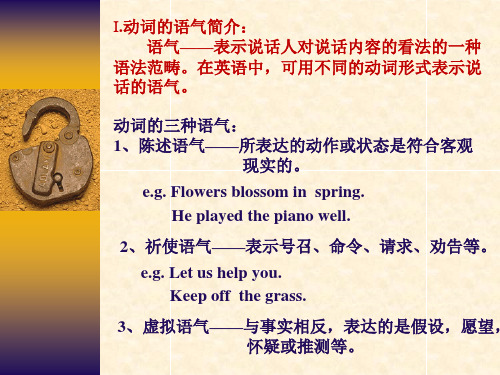
A. do not have
C. will not have
B. did not have
D. had not had
3.He ____busy yesterday, or he ___you with your experiment. A. was, had helped B. was, would have helped C. had been, would have helped D. were, would have helped
五个句型五
It’s (about/high) time +that -- 过去时(偶尔会
用should+动原)
你该走了。It’s high time that you went.
It’s high time that you should go.
我们该出去玩了。 It’s time that we went out to play.
注意: 如果表示的事情可能会发生, 方式状语从句 中的谓语动词可用陈述语气。
五个句型四
现在: 过去时
would rather (that) -- 过去: 过去完成时
将来: 过去时
paid • I would rather you ______(pay) me now. had gone • I would rather you ___________(go) to the party yesterday. came • Don’t come. I would rather you ____ tomorrow.
5)含蓄条件句
有时,假设情况不以if条件句表现出来,而是隐含在 某些介词、副词、 连词或短语中。如 with,without, but for,but that, but,or, otherwise等。 e.g. I lost her phone number, otherwise, I would have rung her up.
- 1、下载文档前请自行甄别文档内容的完整性,平台不提供额外的编辑、内容补充、找答案等附加服务。
- 2、"仅部分预览"的文档,不可在线预览部分如存在完整性等问题,可反馈申请退款(可完整预览的文档不适用该条件!)。
- 3、如文档侵犯您的权益,请联系客服反馈,我们会尽快为您处理(人工客服工作时间:9:00-18:30)。
虚拟语气
虚拟语气:表示动作或状态不是客观存在的事实,而是说话人的主观愿望、假设或推测等。
一、if从句:
(二)错综时间的虚拟句:通常情况下,在条件句中主句和从句的谓语动词所指时间一致, 但有
时也可能指不同的时间,这时主句和从句的动作不是发生在同一时
间,其动词形式要根据时间而定。
1. If I were you, I would have taken his advice. (从句指现在, 主句指过去)。
2. If I had taken my raincoat with me this morning, I would not be wet now. (从句指过去,主句指现在)。
3. If we hadn’t been working hard in the past few years, things wouldn’t be going so smoothly.
(从句指过去,主句指现在)。
4. If the weather had been more favorable, the crops would be growing still better.(从句指过去,主句指现在)。
5. If we had not got everything ready by now, we should be having a more terrible time tomorrow. (从句指现在,主句指将来)
(三)省略:If 从句中含有were, should, had时,可省略if并把were, should, had提前。
例如:Were I you, I wouldn’t quarrel with him.
备注:注:would, should, could与might的选择:
①一般常用would,如同在真实条件句中主句常要用will一样。
常译作“将、就会”。
如:
If I knew him, I would ask him for help. 如果我认识他的话,我就会向他求助。
②should在虚拟条件句中用得最少,现在几乎不用。
可能是因为在陈述语气中第一人称后面
可以用shall,所以在虚拟语气中,理论上讲,第一人称后也可用should。
但在现代英语中,特别是美语中,人们常说:I’ll go home.或I will go home. 但很少人说I shall go home. 因此,在虚拟条件句中,should也很少用。
③could用于虚拟条件句中时,有“能够,可能”之意。
如:
If you had come back a little earlier, you could have seen it yourself.
如果你回来得再稍早一点,你就可能亲眼目睹这件事了。
④might用于虚拟条件句时,常译作“或许”,表示可能性有,但不敢肯定。
如:
If I had been there, I might have quarreled with him. 如果我当时在场的话,我或许会和他吵起来。
二、(should)do (should可以省略)形式的虚拟:宾语、表语、同位语都要求虚拟
(一)一坚持(insist)一推荐(recommend)三命令(order, command, direct) 三建议(suggest, advice, propose) 五要求(demand, require, request, urge, ask)
口诀:①I drop cars. ②Crid soap
即“I:insist坚决,D:demand/desire要求/请求,R:request请求require要求/需要,O:order命令,P:propose 建议,C:command命令,A:ask命令,advise建议,P:prefer宁愿,S:suggest建议”
注意:insist:①坚决宣称, 坚持认为,坚持说,固执己见(不虚拟)②坚决要求,坚持(虚拟)suggest:①暗示(不虚拟)②建议, 提议(虚拟)
1. The man insisted that he didn’t steal the wallet and should be set free now.
2. Her pale face suggested that she was badly ill, so I suggested that she should go to see a doctor at once.
3. My suggestion is that he should go there at once.
4. It is suggested that he should go there at once.
5. I made a suggestion that he should go there at once.
6. This is the suggestion that/ which he made at the meeting.(定语从句不用虚拟)
(二)It is adj. for sb. that 主语+(should) do. (也可不虚拟)
It is a pity/ a shame/ no wonder that主语+(should) do. (也可不虚拟)
例如:1. It is necessary that he should be sent to the hospital at once.
2. It is a pity that he should miss such a golden chance.
三、It is (high) time that 虚拟)过去式
should do(should不能省略)
It is time that we got up.
should get up.
四、would / could / might / should +have done
(一)without, but for…, 主语+ would / could / might / should +have done。
(如果不…;要不是…)例:But for your help yesterday, I couldn’t have done it well.
(二)but: 主语+ would / could / might / should +have done, but+句子.(真实的)otherwise:句子(真实的),otherwise主语+ would / could / might / should +have done.
例:I would have taken part in the sports meeting, but I was ill.
I was ill; otherwise I would have taken part in the sports meeting.
五、wish, as if/ though, if only的从句:过去式(did)(be常用were) (表示与现在事实情况相反)
过去完成式(had done) (表示与过去事实情况相反)
would / could / might + do(表示与将来事实情况相反)例如:If only he had visited us yesterday.
六、would rather do than do
+句子(虚拟)过去式(did)(be常用were)表示与现在或将来情况相反
过去完成式(had +done) 表示与过去情况相反
七、Long live +主语!例:Long live the people!
May you do sth.! 例:May you succeed!
八、had+ expected/wanted/intended/planned/hoped/wished/thought/dreamed等表个人意志、打
算、想法的动词的过去分词,表示“本来要做某事(暗含但是后来没有做成的)”。
其宾语从句的谓语用“would+动词原形”。
例:I had hoped that she would go to the U.S. and study there, but she said she liked to stay in China.。
